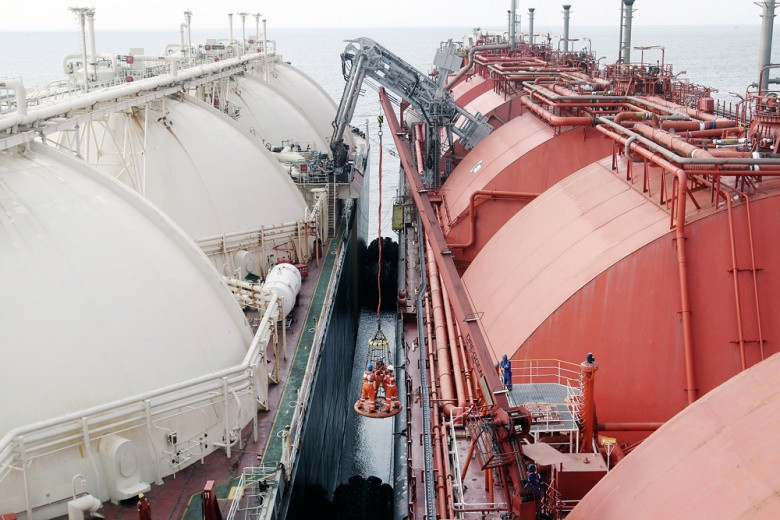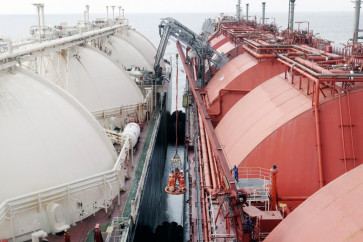Popular Reads
Top Results
Can't find what you're looking for?
View all search resultsPopular Reads
Top Results
Can't find what you're looking for?
View all search resultsProper LNG import policy could stimulate gas industry
Many countries around the world are successful without the benefit of the natural resource base Indonesia holds. The Indonesian economy has transitioned from one of a net crude oil exporter to a net crude oil importer. Yes, painful at times, but the economy has adjusted and grown.
Change text size
Gift Premium Articles
to Anyone
 Fill it up: A floating storage regasification unit (FSRU) belonging to PT Nusantara Regas (left) receives its first LNG supply in 2018 from LNG carrier Aquarius operated by PT Pertamina Hulu Mahakam in Jakarta Bay. Gas prices for industry remain high in Indonesia, despite the country being one of the world’s major gas producers. (JP/Ben Latuihamallo)
Fill it up: A floating storage regasification unit (FSRU) belonging to PT Nusantara Regas (left) receives its first LNG supply in 2018 from LNG carrier Aquarius operated by PT Pertamina Hulu Mahakam in Jakarta Bay. Gas prices for industry remain high in Indonesia, despite the country being one of the world’s major gas producers. (JP/Ben Latuihamallo)
P
resident Joko “Jokowi” Widodo has ordered his Cabinet to evaluate the possibility of supplying natural gas to consumers at US$6 per million British thermal units (MMBTU). The President outlined three measures he wanted addressed: First, reduction of the government’s share in the gas sales price; second, the use of a domestic market obligation (DMO); and third, permitting the private sector to import lower cost liquefied natural gas (LNG) from foreign sources.
At least two national objectives drive this imperative: First, the need for Indonesia to be a competitive manufacturing economy in both the domestic and the export sector; and second, the attraction of capital, foreign and domestic, to support the expansion of the manufacturing sector and create employment opportunities. The accomplishment of these goals would improve Indonesia’s position in the global value chain (GVC).
The reduction of the government’s share in oil and gas operations seems a likely possibility. Indonesia’s economy has broadened into a multidimensional effort across many trading platforms. This is opposed to the economy of the 1970s and 1980s, when the oil and gas sector supplied up to 80 percent of all foreign revenue generated to support national needs. The role Pertamina played in Indonesia’s early development will never be forgotten and still drives many of the positions on national issues.
There has already been structural reform, such as the much improved availability of exploration results and production data. Also, improved flexibility in risk sharing by the government is clearly noticeable. However, a policy of dedicating a portion of the reduced government share to be used for the identification of gas resources in unexplored and marginally explored basins, would reduce the risk to investors and add value to Indonesia’s gas resources. This strategic policy initiative would serve the long term national interest of reducing the government’s share but increasing revenues through building a bigger pie.
The imposition of a DMO on gas production is less attractive, as it sends unclear signals regarding the capital risk of investment in exploration. Historically, the application of a DMO protocol has been subject to numerous, and unpredictable changes, thus spooking investors.
The third alternative deserves attention. The common, and main rallying point among opponents to LNG importation is its negative effect of the Indonesian balance of payments.
Many countries around the world are successful without the benefit of the natural resource base Indonesia holds. The Indonesian economy has transitioned from one of a net crude oil exporter to a net crude oil importer. Yes, painful at times, but the economy has adjusted and grown.

















